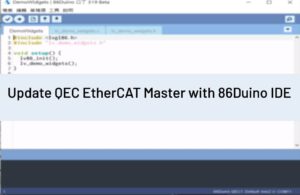[CANBus]
Description
Initialize transmission state.
Note: Usage for this function is similar to the beginTransmission() function for Wire. Immediately after calling this function, the write() and endTransmission() functions must be called to complete the transmission task.
Syntax
CAN.beginTransmission(id)
CAN.beginTransmission(id, ext)
Parameters
- id: External CAN device ID
- ext: Data transmission format. This parameter is not needed for the function to work. When not set, the default, CAN_STDID, is used.
CAN_STDID: Standard data frame, comply with CAN 2.0A standard. ID range: 0 ~ 0x7FF
CAN_EXTID: Extended data frame, based on CAN 2.0B standard. ID range: 0 ~ 0x1FFFFFFF
CAN_STDID_REMOTE: Standard data frame, comply with CAN 2.0A standard. ID range: 0 ~ 0x7FF
CAN_EXTID_REMOTE: Extended data frame, comply with CAN 2.0B standard. ID range: 0 ~ 0x1FFFFFF
Returns
None
Examples
#include <CANBus.h>
unsigned char buf[8] = {0, 1, 2, 3, 4, 5, 6, 7};
void setup() {
Serial.begin(115200);
CAN.begin(CAN_500KBPS); // Configure CAN bus transmission speed to 500KBPS
}
void loop() {
CAN.beginTransmission(0x00); // Set the CAN device ID to 0x00, using standard data grame.
CAN.write(buf, 8); // Sent 8 bytes of data
CAN.endTransmission(); // End transmission
delay(10);
}See also
Libraries Reference Home
The text of the 86Duino reference is a modification of the Arduino reference and is licensed under a Creative Commons Attribution-ShareAlike 3.0 License. Code samples in the reference are released into the public domain.



